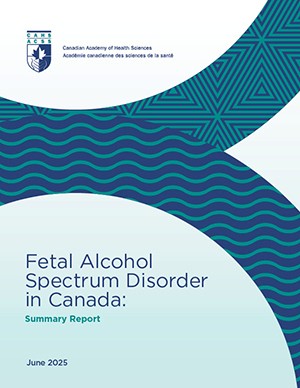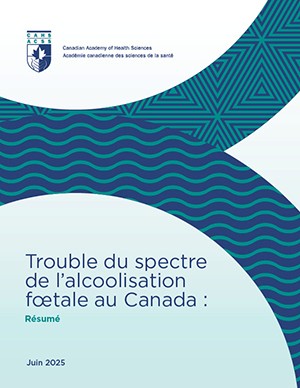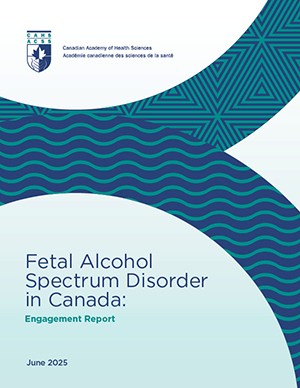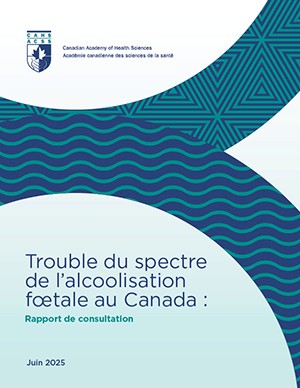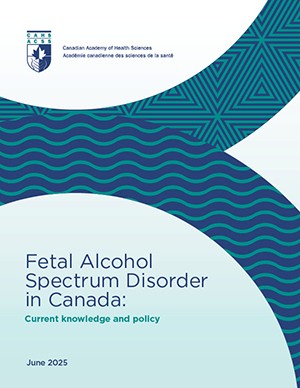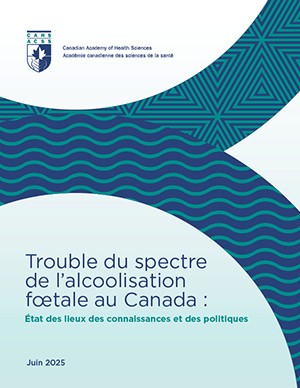
The Reports | Les rapports

Press Release | Communiqué de presse
Ottawa, ON- The Canadian Academy of Health Sciences (CAHS) is pleased to announce the release of the report on “Fetal Alcohol Spectrum Disorder (FASD) in Canada: Current Knowledge and Policy”, funded by the Public Health Agency of Canada (PHAC).
PHAC charged CAHS with answering key questions on uptake of FASD diagnostic guidelines, challenges associated with case identification and data collection, strengthening prevention activities, and identification of tools, resources, and supports for people with FASD and their families.
The report is the result of evidence reviews, extensive consultations across Canada, and panel discussions beginning in 2024. An independent fifteen-member Panel, including academic researchers and people with FASD and family members, provided the leadership for this assessment by reviewing the findings from the evidence, engagement input, and external peer review to prepare the report.
“This report will be helpful for policymakers and legislators, as well as for the groups and communities working to support people through their pregnancies to prevent prenatal alcohol exposure, and for those working to support people with FASD and their families to build healthy and rewarding futures and to mitigate the consequences of FASD across the lifespan,” said Professor Jennifer Chandler, the Chair of the Assessment Panel.
The report presents 28 key findings, specifically on:
- The significance and challenges of gathering epidemiological information to inform the response to this public health issue;
- The current best thinking on how to prevent prenatal alcohol exposure through education, alcohol policy, and access to health care and holistic wraparound supports;
- Issues with the diagnostic process and capacity, and the importance of early assessment;
- Key forms of interventions and supports needed and desired by people with FASD and their families in order to flourish across the lifespan.
The full report is available at this link. For further information, please contact sbuy@cahs-acss.ca
Ottawa, ON – L’Académie canadienne des sciences de la santé (ACSS) a le plaisir d’annoncer la publication du rapport intitulé « Trouble de l’alcoolisation fœtale au Canada : État des lieux des connaissances et des politiques », rapport financé par l’Agence de la santé publique du Canada (ASPC).
L’ASPC a demandé à l’ACSS de répondre à des questions clés sur les lignes directrices concernant le diagnostic du TSAF, sur les difficultés rencontrées en ce qui concerne le recensement des cas et la collecte de données, sur le renforcement des activités de prévention et sur les outils, ressources et soutiens nécessaires pour améliorer les résultats en faveur des personnes ayant un TSAF et de leurs familles.
Le rapport est le fruit d’examens de données probantes, de consultations exhaustives à l’échelle du Canada et de discussions en comité à compter de 2024. Un comité indépendant constitué de quinze membres, comprenant des chercheurs universitaires et des personnes ayant un TSAF de même que des membres des familles concernées, ont assuré la direction de cette évaluation en étudiant les conclusions tirées à la lumière des données probantes, des avis exprimés dans le cadre du processus de consultation et d’un examen externe par des pairs évaluateurs et ce, afin de rédiger le rapport.
« Ce rapport sera utile pour les décideurs politiques et les législateurs, de même que pour les groupes et les communautés qui s’efforcent d’aider les femmes enceintes à prévenir l’exposition prénatale à l’alcool, et pour ceux qui aident les personnes ayant un TSAF et les familles concernées à bâtir des avenirs sains et enrichissants et à atténuer les effets du TSAF tout au long de la vie », a déclaré la professeure Jennifer Chandler, présidente du comité d’évaluation.
Le rapport présente 28 conclusions majeures, notamment sur ce qui suit :
- La signification et les défis liés à la collecte de renseignements épidémiologiques pour éclairer la réponse à ce problème de santé publique.
- Les meilleures réflexions actuelles sur les moyens de prévenir l’exposition prénatale à l’alcool par le biais de l’éducation, des politiques en matière d’alcool et de l’accès aux soins de santé et à des soutiens complets et holistiques.
- Les problèmes liés au processus et aux capacités de diagnostic, et l’importance de l’évaluation précoce.
- Les formes majeures d’intervention et de soutien nécessaires et désirées par les personnes ayant un TSAF et les membres des familles concernées, leur permettant de s’épanouir tout au long de la vie.
Le rapport complet est disponible en cliquant sur ce lien. Pour obtenir de plus amples renseignements, veuillez envoyer un courriel à sbuy@cahs-acss.ca.

Biographies
Assessment Panel | Comité d’évaluation
Meet the Members | Découvrez les membres :
 |
Jennifer Chandler, LLM, Chair | LL. M., présidente
Jennifer Chandler is a professor of law and holder of the Bertram Loeb Research Chair at the University of Ottawa. Her work illuminates how the law responds to advances in biomedicine, and how those responses affect the lives of vulnerable people and society. Her scholarship, testimony, and contributions to government independent expert panels have looked at fetal alcohol spectrum and other neurological syndromes in the criminal justice system, mental health policy and practice, neurotechnologies, brain death, medical aid in dying, and organ donation and transplantation policy. Jennifer’s work brings health sciences and clinical practice into effective conversation with human rights, criminal justice, ethics, and regulatory policy. |
 |
Leigh Wincott, MD, BSc, Vice-Chair | M.D., B. Sc., vice-président
Leigh Wincott is a pediatrician and an Associate Clinical Professor at the University of Alberta. With nearly 30 years’ experience in FASD diagnosis and management, his clinical work has focused on providing pediatric consultation on neurodevelopmental disorders in Edmonton and northern Alberta. Previously, Leigh worked as a pediatrician in northern Manitoba, serving more than 20 remote Indigenous communities. He is a founding member of the first rural/remote multidisciplinary FASD diagnostic team in Thompson, Manitoba, and of the University of Manitoba’s northern specialty program. Currently, Leigh is president of the Canadian Pediatric Society’s Mental Health Section and a member of its Mental Health and Developmental Disabilities Committee. |
 |
Shannon Butt
Shannon Butt is an interdisciplinary artist, movement and meditation facilitator, and public speaker for disability and social justice based in Lanark County, Ontario. She braids together strands of knowledge with her lived experience as a person living with Fetal Alcohol Spectrum Disorder to provide a unique perspective on where disability meets the social determinants of health. She is the Founder of Outkast Alley, a community created for Neurodiverse Adults, and sits as a Changemaker on the Adult Leadership Collaborative board of individuals with FASD. Shannon’s work is a window into how we as a whole can make a more accessible and inclusive society for all. |
 |
Janet Carioni
Janet’s FASD journey began many years ago as an occupational therapist where her curiosity about FASD drew her to her first FASD conference. Since then, Janet has worked on multidisciplinary FASD assessment teams and her passion to speak about FASD has taken her on wonderful adventures across Canada. Throughout her professional FASD journey, Janet recognized a familiar story unfolding at home, she was no longer just journeying through FASD professionally, her personal life came along for the ride too. As she continues to grow in her learning, her greatest teachers have been her sons and the many individuals with FASD who are a part of her life. |
 |
Peter Choate MSW, PhD, PhD, RCSW | travailleur social hospitalier, Ph. D., Ph. D., TSCI
Peter Choate’s teaching focuses on social work assessment issues and child and adolescent mental health. His research includes Fetal Alcohol Spectrum Disorder (stigma and implications for front line practice), assessment of parents within child protection systems, child protection practice errors, and implementation of Truth and Reconciliation Commission Calls to Action within the practice of social work. He is an expert witness in social work, including in FASD, and has published and presented extensively on assessment and child protection. Peter works with the National Judicial Institute to educate federally appointed judges in the areas of family assessments and impacts of interpersonal violence on children. |
 |
Patricia Conrod, PhD | Ph. D.
Patricia Conrod, Clinical Psychologist and Professor of Psychiatry at Université de Montréal, holds a Tier 1 Canada Research Chair in Preventative Mental Health and Addiction. Patricia co-leads the Quebec Research Network on Suicide, Mood Disorders and Related Conditions and the Canadian Cannabis and Psychosis Research Team. She developed a targeted drug and alcohol prevention program which was evaluated in multiple international trials and is now recognised as an evidence-based program in the U.S. Surgeon General’s Report on Addiction and the UNODC’s International Guidelines on Drug Prevention. She has published over 200 peer-reviewed articles, widely covered in the media. |
 |
Lori Vitale Cox, PhD | Ph. D.
Lori Vitale Cox is a community researcher and clinician. She works in Elsipogtog First Nation as the Director and founder of the Eastern Door Center, which uses a Two-Eyed Seeing approach to diagnosis, prevention and intervention of trauma-related neurodevelopmental disorders such as FASD. Lori developed the Medicine Wheel Tools for screening and intervention in collaboration with Indigenous Elders across Canada. Her Two-Eyed Seeing diagnostic tool was inspired by Mi’gmag Elders Noel Milliea and Albert and Murdena Marshal. This work offers a culturally safe family approach to FASD service delivery embedded in the community system. |
 |
Maude Dubois Mercier, MSc
Maude Dubois Mercier is a nurse by training with a rich clinical experience. She worked for the Centre hospitalier universitaire Sainte-Justine (Sainte-Justine University Hospital) for 13 years, including 10 years with the birthing unit. In a bid to better support and understand the path of women and young families, she became an advocate for breast-feeding and recovery. Maude Dubois Mercier also has a masters in public health. She currently works for the Association pour la santé publique du Québec (Quebec public health association) where she is responsible for projects in perinatal care. |
 |
Twyla Gilroy
Twyla Gilroy is an FASD Diagnostic Coordinator with the Manitoba FASD Network covering Dauphin/Swan River region. She is passionate about raising awareness and providing education to community and service providers about Fetal Alcohol Spectrum Disorder. She assists and supports families as they navigate the process of an FASD assessment. Twyla has worked as a coordinator with the InSight Mentoring program, which supports women using an evidenced-based FASD prevention model (P-CAP). She has a strong background in the field of addictions and substance use. Twyla is a Registered Social Worker in Manitoba. |
 |
Kathy Kalinowsky
Kathy Kalinowsky is the mother of a 20-year old adopted son who has FASD. He is enrolled in carpentry at the local college and lives at home. He is very athletic and involved in many sports. Kathy is a recently retired lawyer, specializing in health law. |
 |
Stacey Kelsh, MEd | M.Éd.
For more than sixteen years, Stacey has taught and led in a variety of diverse public education settings. As a classroom teacher, resource teacher, university sessional instructor, provincial educator, and provincial program lead, he has experience from elementary to post-secondary. He is honoured to continuously learn from those in the field of FASD and share that knowledge with BC educators through his role with the Provincial Outreach Program for Fetal Alcohol Spectrum Disorder. Stace’s sincere passion is to better support educators to enhance their practice and grow their capacities to reach, teach, and include students impacted by prenatal alcohol exposure. |
 |
Neena Mackinnon, MEd, MA | M.Éd., M.A.
Neena MacKinnon is the Executive Director for Fetal Alcohol Syndrome Society of Yukon (FASSY). After completing her Masters in Adult Education, she moved to Whitehorse, Yukon, where she continues to gain insight into the unique needs of people living north of 60°. Neena brings living experience of working with adults who have FASD as well as raising a child with Prenatal Alcohol Exposure. Her academic and experiential knowledge are a welcome addition to the project at hand. |
 |
Chris Mushquash, PhD, CPsych | Ph. D., psychologue clinique
Christopher Mushquash is Anishinawbe (Ojibway) and a member of Pawgwasheeng (Pays Plat First Nation). He is also a researcher and clinician who integrates traditional knowledge into his work, exploring sustainable ways of healing that also address systemic problems Indigenous Peoples continue to face in Canada. His research has upended conventional understandings of mental health in Indigenous families and established best practices for engaging Indigenous people in research. Furthermore, his research has directly influenced federal funding policy in First Nations communities, and assisted leaders of those communities to advocate for culturally and contextually informed services for their people. |
 |
Tanya Northcott
Tanya Northcott is a Certified FASD Educator, FASD Consultant, Advocate and Mentor. She is an Inspirational Speaker and Presenter on FASD. Tanya is a ‘Status Indian’ of Ojibway and West Coast Indigenous descent and is included in the “60’s Scoop,” which led her to being adopted by a Newfoundland couple and raised in St. John’s, Newfoundland. She is also an award-winning Photographer and an accomplished Artist specializing in Soapstone Sculptures. |
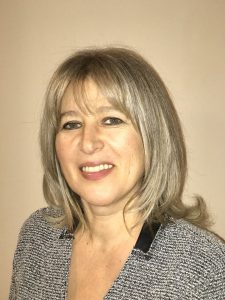 |
Svetlana (Lana) Popova, MD, PhDs, MPH | M.D., Ph. D., M.P.H.
Lana Popova’s research focuses on epidemiology, economic cost, prevention, intervention strategies, and evidence-based policy development related to maternal substance use and child outcomes, including Fetal Alcohol Spectrum Disorder. She has led studies on developing and implementing FASD prevention in Ontario schools; determining global prevalence of FASD; and developing surveillance of FASD and prenatal alcohol exposure, as well as on estimating the burden and economic cost associated with FASD in Canada. She is a Senior Scientist with the Institute for Mental Health Policy Research at the Centre for Addiction and Mental Health (CAMH) an Associate Professor in Epidemiology Department at the Dalla Lana School of Public Health and Factor-Inwentash Faculty of Social Work at the University of Toronto. |
 |
James Reynolds, PhD | Ph. D.
James Reynolds is a Professor in the Department of Biomedical and Molecular Sciences at Queen’s University. His interdisciplinary research program over the past 25 years has included both basic and clinical investigations on Fetal Alcohol Spectrum Disorder. From 2010-2020, James was the Program Lead for the Fetal Alcohol Spectrum Disorder Research Program in the Kids Brain Health Network. Since 2018, James has served as the Kids Brain Health Network’s Chief Scientific Officer, providing scientific leadership to an interdisciplinary network of researchers, clinicians, parents, and partner organizations who work together collaboratively to improve outcomes for children and families. |

